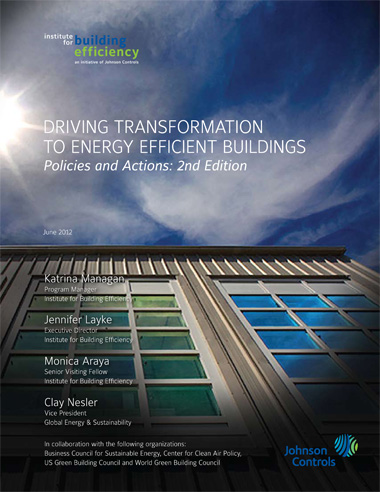5 June 2012
New Report, Tool Kit Assist all Countries in Doubling Rate of Energy Efficiency Improvement by 2030
On World Environment Day, Johnson Controls, launched Driving Transformation to Energy Efficient Buildings: Policies and Actions. This tool kit is designed to help the estimated 6.5 billion people who will live and work in urban buildings by 2050 breath cleaner air, be more comfortable, save money, and reduce carbon emissions.
The report includes a Building Efficient Policy Assessment Tool, presented in Colombia earlier this year, which delivers a simple framework to help governments set policy priorities especially in developing countries that will account for 85% of the world’s rising energy demand.
"We are launching a step-by-step process for countries to follow to help increase the rate of energy efficiency improvement in buildings," said Iain Campbell, vice president and general manager, Global Energy and WorkPlace Solutions, Building Efficiency, Johnson Controls. "Today, buildings consume 40% of the world’s energy. The program outlined in this free tool kit will help businesses and governments move rapidly to adopt policies and programs that will make a positive impact on the environment while reducing costs."
The report was completed over the past 13 months with help from global partner organizations the Business Council for Sustainable Energy, the Center for Clean Air Policy, the World Green Building Council and the U.S. Green Building Council.
The tool kit is part of the second edition of Driving Transformation to Energy Efficient Buildings: Policies and Actions, which supports global efforts to transform buildings and includes two case studies, helping countries address the six categories of government policies and actions needed to improve building efficiency.
- Building efficiency codes and standards—Decrease long-term costs with well-designed buildings
- Energy efficiency improvement targets—Motivate countries and cities to act
- Policies and actions that increase awareness—Encourage better energy management among owners, operators, and tenants
- Financial incentives—Help overcome energy efficiency project cost barriers
- Utility programs—Encourage utility customers to be more energy efficient
- Human and technical capacity—Support workforce training and technical assistance.
The tool kit includes a workshop facilitator’s guide, templates, and analysis tools. The workshop is designed to help stakeholders collaborate, using visual tools to set priorities.
"As the Asia Development Bank develops our energy efficiency agenda, including building sector, information from the private sector, such as Johnson Control's Driving Transformation Report, provides valuable perspective and information," said Aiming Zhou, energy specialist, Asia Development Bank. "The report will be presented at the Asia Clean Energy Forum as part of a panel on building efficiency policies and actions."
According to the International Energy Agency, energy efficiency measures could deliver two-thirds of the energy-related carbon dioxide emission reductions needed to maintain climate protection. Efficient buildings will do more to reduce carbon emissions quickly and at a lower cost than any other strategy.
"The tool kit appears to be a useful way to focus stakeholder discussions and evaluate building efficiency policy options based on objective factors," said Maria Paula Mendieta of the Ministry of the Environment and Sustainable Development in Colombia. "It provides a flexible framework that we can adapt to evaluate the most effective building efficiency policies in our local circumstances."
Johnson Controls supports "Sustainable Energy for All," an initiative of the United Nations Secretary-General Ban Ki-moon, including the goal to mobilize action from all sectors of society in support of doubling the global rate of improvement in energy efficiency by 2030.
Source: Johnson Controls

